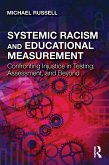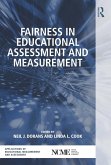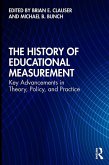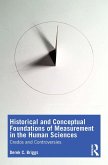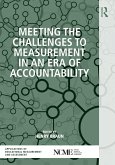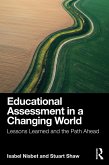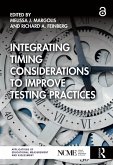Classroom Assessment and Educational Measurement (eBook, PDF)
Redaktion: Brookhart, Susan M.; McMillan, James H.
0,00 €
0,00 €
inkl. MwSt.
Sofort per Download lieferbar

0 °P sammeln
0,00 €
Als Download kaufen

0,00 €
inkl. MwSt.
Sofort per Download lieferbar

0 °P sammeln
Jetzt verschenken
Alle Infos zum eBook verschenken
0,00 €
inkl. MwSt.
Sofort per Download lieferbar
Alle Infos zum eBook verschenken

0 °P sammeln
Classroom Assessment and Educational Measurement (eBook, PDF)
Redaktion: Brookhart, Susan M.; McMillan, James H.
- Format: PDF
- Merkliste
- Auf die Merkliste
- Bewerten Bewerten
- Teilen
- Produkt teilen
- Produkterinnerung
- Produkterinnerung

Bitte loggen Sie sich zunächst in Ihr Kundenkonto ein oder registrieren Sie sich bei
bücher.de, um das eBook-Abo tolino select nutzen zu können.
Hier können Sie sich einloggen
Hier können Sie sich einloggen
Sie sind bereits eingeloggt. Klicken Sie auf 2. tolino select Abo, um fortzufahren.

Bitte loggen Sie sich zunächst in Ihr Kundenkonto ein oder registrieren Sie sich bei bücher.de, um das eBook-Abo tolino select nutzen zu können.
Classroom Assessment and Educational Measurement explores the ways in which the theory and practice of both educational measurement and the assessment of student learning in classroom settings mutually inform one another.
- Geräte: PC
- ohne Kopierschutz
- eBook Hilfe
- Größe: 18.24MB
Andere Kunden interessierten sich auch für
![Systemic Racism and Educational Measurement (eBook, PDF) Systemic Racism and Educational Measurement (eBook, PDF)]() Michael RussellSystemic Racism and Educational Measurement (eBook, PDF)49,95 €
Michael RussellSystemic Racism and Educational Measurement (eBook, PDF)49,95 €![Fairness in Educational Assessment and Measurement (eBook, PDF) Fairness in Educational Assessment and Measurement (eBook, PDF)]() Fairness in Educational Assessment and Measurement (eBook, PDF)0,00 €
Fairness in Educational Assessment and Measurement (eBook, PDF)0,00 €![The History of Educational Measurement (eBook, PDF) The History of Educational Measurement (eBook, PDF)]() The History of Educational Measurement (eBook, PDF)41,95 €
The History of Educational Measurement (eBook, PDF)41,95 €![Historical and Conceptual Foundations of Measurement in the Human Sciences (eBook, PDF) Historical and Conceptual Foundations of Measurement in the Human Sciences (eBook, PDF)]() Derek C. BriggsHistorical and Conceptual Foundations of Measurement in the Human Sciences (eBook, PDF)60,95 €
Derek C. BriggsHistorical and Conceptual Foundations of Measurement in the Human Sciences (eBook, PDF)60,95 €![Meeting the Challenges to Measurement in an Era of Accountability (eBook, PDF) Meeting the Challenges to Measurement in an Era of Accountability (eBook, PDF)]() Meeting the Challenges to Measurement in an Era of Accountability (eBook, PDF)0,00 €
Meeting the Challenges to Measurement in an Era of Accountability (eBook, PDF)0,00 €![Educational Assessment in a Changing World (eBook, PDF) Educational Assessment in a Changing World (eBook, PDF)]() Isabel NisbetEducational Assessment in a Changing World (eBook, PDF)37,95 €
Isabel NisbetEducational Assessment in a Changing World (eBook, PDF)37,95 €![Integrating Timing Considerations to Improve Testing Practices (eBook, PDF) Integrating Timing Considerations to Improve Testing Practices (eBook, PDF)]() Integrating Timing Considerations to Improve Testing Practices (eBook, PDF)0,00 €
Integrating Timing Considerations to Improve Testing Practices (eBook, PDF)0,00 €-
-
-
Classroom Assessment and Educational Measurement explores the ways in which the theory and practice of both educational measurement and the assessment of student learning in classroom settings mutually inform one another.
Dieser Download kann aus rechtlichen Gründen nur mit Rechnungsadresse in A, B, BG, CY, CZ, D, DK, EW, E, FIN, F, GR, HR, H, IRL, I, LT, L, LR, M, NL, PL, P, R, S, SLO, SK ausgeliefert werden.
Produktdetails
- Produktdetails
- Verlag: Taylor & Francis eBooks
- Seitenzahl: 296
- Erscheinungstermin: 4. Juli 2019
- Englisch
- ISBN-13: 9780429017612
- Artikelnr.: 57083131
- Verlag: Taylor & Francis eBooks
- Seitenzahl: 296
- Erscheinungstermin: 4. Juli 2019
- Englisch
- ISBN-13: 9780429017612
- Artikelnr.: 57083131
- Herstellerkennzeichnung Die Herstellerinformationen sind derzeit nicht verfügbar.
Susan M. Brookhart is Professor Emerita in the School of Education at Duquesne University, USA, and an independent educational consultant. James H. McMillan is Professor in the Department of Foundations of Education in the School of Education at Virginia Commonwealth University, USA.
Contributor Biographies. Introduction, Susan M. Brookhart and James H.
McMillan I. Classroom Assessment Information 1. Perspectives on the
Validity of Classroom Assessments, Michael T. Kane and Saskia Wools 2.
Cognitive Diagnosis is Not Enough: The Challenge of Measuring Learning with
Classroom Assessments, Jacqueline P. Leighton 3. Language in Practice: A
Mediator of Valid Interpretations of Information Generated by Classroom
Assessments among Linguistically and Culturally Diverse Students, Alison L.
Bailey and Richard Durán 4. Feedback and Measurement, Susan M. Brookhart
5. Discussion of Part I: Assessment Information in Context, James H.
McMillan II. The Use of Classroom Assessment Information to Enhance
Learning 6. Guidance in the Standards for Classroom Assessment: Useful or
Irrelevant? Steve Ferrara, K. Maxey-Moore, and Susan M. Brookhart 7.
Defining Trustworthiness for Teachers' Multiple Uses of Classroom
Assessment Results, Alicia C. Alonzo 8. Learning Progressions and Embedded
Assessment, Derek C. Briggs and Erin M. Furtak 9. The Role of
Technology-Enhanced Self and Peer Assessment in Formative Assessment, E.
Caroline Wylie and Christine J. Lyon 10. Discussion of Part II: Should
"Measurement" Have a Role in Teacher Learning about Classroom Assessment?
Lorrie A. Shepard III. Emerging Issues in Classroom Assessment 11. Towards
Measures of Different and Useful Aspects of Schooling: Why Schools Need
Both Teacher Assigned Grades and Standardized Assessments, Alex J. Bowers
12. Digital Technologies: Supporting and Advancing Assessment Practices in
the Classroom, Michael Russell 13. Fairness in Classroom Assessment, Joan
Herman and Linda Cook 14. Discussion of Part III: Emerging Issues in
Classroom Assessment, Mark R. Wilson
McMillan I. Classroom Assessment Information 1. Perspectives on the
Validity of Classroom Assessments, Michael T. Kane and Saskia Wools 2.
Cognitive Diagnosis is Not Enough: The Challenge of Measuring Learning with
Classroom Assessments, Jacqueline P. Leighton 3. Language in Practice: A
Mediator of Valid Interpretations of Information Generated by Classroom
Assessments among Linguistically and Culturally Diverse Students, Alison L.
Bailey and Richard Durán 4. Feedback and Measurement, Susan M. Brookhart
5. Discussion of Part I: Assessment Information in Context, James H.
McMillan II. The Use of Classroom Assessment Information to Enhance
Learning 6. Guidance in the Standards for Classroom Assessment: Useful or
Irrelevant? Steve Ferrara, K. Maxey-Moore, and Susan M. Brookhart 7.
Defining Trustworthiness for Teachers' Multiple Uses of Classroom
Assessment Results, Alicia C. Alonzo 8. Learning Progressions and Embedded
Assessment, Derek C. Briggs and Erin M. Furtak 9. The Role of
Technology-Enhanced Self and Peer Assessment in Formative Assessment, E.
Caroline Wylie and Christine J. Lyon 10. Discussion of Part II: Should
"Measurement" Have a Role in Teacher Learning about Classroom Assessment?
Lorrie A. Shepard III. Emerging Issues in Classroom Assessment 11. Towards
Measures of Different and Useful Aspects of Schooling: Why Schools Need
Both Teacher Assigned Grades and Standardized Assessments, Alex J. Bowers
12. Digital Technologies: Supporting and Advancing Assessment Practices in
the Classroom, Michael Russell 13. Fairness in Classroom Assessment, Joan
Herman and Linda Cook 14. Discussion of Part III: Emerging Issues in
Classroom Assessment, Mark R. Wilson
Contributor Biographies. Introduction, Susan M. Brookhart and James H.
McMillan I. Classroom Assessment Information 1. Perspectives on the
Validity of Classroom Assessments, Michael T. Kane and Saskia Wools 2.
Cognitive Diagnosis is Not Enough: The Challenge of Measuring Learning with
Classroom Assessments, Jacqueline P. Leighton 3. Language in Practice: A
Mediator of Valid Interpretations of Information Generated by Classroom
Assessments among Linguistically and Culturally Diverse Students, Alison L.
Bailey and Richard Durán 4. Feedback and Measurement, Susan M. Brookhart
5. Discussion of Part I: Assessment Information in Context, James H.
McMillan II. The Use of Classroom Assessment Information to Enhance
Learning 6. Guidance in the Standards for Classroom Assessment: Useful or
Irrelevant? Steve Ferrara, K. Maxey-Moore, and Susan M. Brookhart 7.
Defining Trustworthiness for Teachers' Multiple Uses of Classroom
Assessment Results, Alicia C. Alonzo 8. Learning Progressions and Embedded
Assessment, Derek C. Briggs and Erin M. Furtak 9. The Role of
Technology-Enhanced Self and Peer Assessment in Formative Assessment, E.
Caroline Wylie and Christine J. Lyon 10. Discussion of Part II: Should
"Measurement" Have a Role in Teacher Learning about Classroom Assessment?
Lorrie A. Shepard III. Emerging Issues in Classroom Assessment 11. Towards
Measures of Different and Useful Aspects of Schooling: Why Schools Need
Both Teacher Assigned Grades and Standardized Assessments, Alex J. Bowers
12. Digital Technologies: Supporting and Advancing Assessment Practices in
the Classroom, Michael Russell 13. Fairness in Classroom Assessment, Joan
Herman and Linda Cook 14. Discussion of Part III: Emerging Issues in
Classroom Assessment, Mark R. Wilson
McMillan I. Classroom Assessment Information 1. Perspectives on the
Validity of Classroom Assessments, Michael T. Kane and Saskia Wools 2.
Cognitive Diagnosis is Not Enough: The Challenge of Measuring Learning with
Classroom Assessments, Jacqueline P. Leighton 3. Language in Practice: A
Mediator of Valid Interpretations of Information Generated by Classroom
Assessments among Linguistically and Culturally Diverse Students, Alison L.
Bailey and Richard Durán 4. Feedback and Measurement, Susan M. Brookhart
5. Discussion of Part I: Assessment Information in Context, James H.
McMillan II. The Use of Classroom Assessment Information to Enhance
Learning 6. Guidance in the Standards for Classroom Assessment: Useful or
Irrelevant? Steve Ferrara, K. Maxey-Moore, and Susan M. Brookhart 7.
Defining Trustworthiness for Teachers' Multiple Uses of Classroom
Assessment Results, Alicia C. Alonzo 8. Learning Progressions and Embedded
Assessment, Derek C. Briggs and Erin M. Furtak 9. The Role of
Technology-Enhanced Self and Peer Assessment in Formative Assessment, E.
Caroline Wylie and Christine J. Lyon 10. Discussion of Part II: Should
"Measurement" Have a Role in Teacher Learning about Classroom Assessment?
Lorrie A. Shepard III. Emerging Issues in Classroom Assessment 11. Towards
Measures of Different and Useful Aspects of Schooling: Why Schools Need
Both Teacher Assigned Grades and Standardized Assessments, Alex J. Bowers
12. Digital Technologies: Supporting and Advancing Assessment Practices in
the Classroom, Michael Russell 13. Fairness in Classroom Assessment, Joan
Herman and Linda Cook 14. Discussion of Part III: Emerging Issues in
Classroom Assessment, Mark R. Wilson

